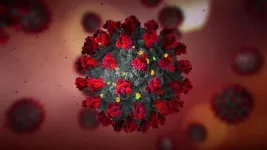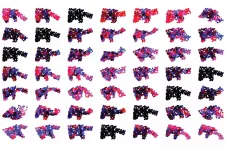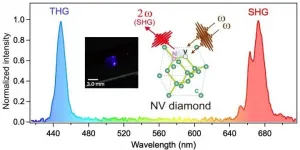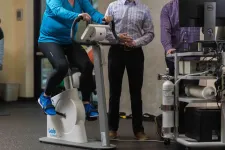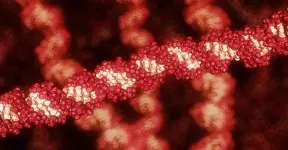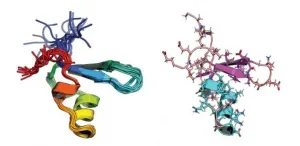(Press-News.org) March 22, 2021 (BRONX, NY)-- Most people with cancer who are infected by the novel coronavirus produce antibodies at a rate comparable to the rest of the population--but their ability to do so depends on their type of cancer and the treatments they've received, according to a new study by researchers at Montefiore Health System and Albert Einstein College of Medicine. The findings, published online today in Nature Cancer, may lead to better care for cancer patients, who face a heightened risk of dying from COVID-19, and suggests that cancer patients should respond well to COVID-19 vaccines.
"We conducted the study out of our concern that cancer patients who develop COVID-19 may not benefit from the same degree of antibody protection as people without cancer, given that many are immuno-compromised," said Astha Thakkar, M.B.B.S., a Montefiore hematologic oncology fellow and first author of the paper. "Our findings provide assurance that most people with cancer are able to mount an antibody response to the coronavirus that is similar to the general population. People with a history of cancer are likely as protected from reinfection as those without a history of disease and are likely to respond well to vaccines, according to our study."
The retrospective study involved 261 cancer patients, 77% of whom were diagnosed with solid malignancies and 23% with hematologic (blood) malignancies. Their overall rate of seroconversion (production of antibodies in response to infection) was 92%. However, when patients with solid and blood malignancies were compared, patients with blood cancers had a seroconversion rate of only 81.7%--significantly lower than the 94.5% seroconversion rate for patients with solid tumors.
"The treatments commonly given to patients with blood cancers--anti-CD20 antibody therapy, stem-cell transplants, and steroids--are known to suppress the immune system, which may explain the lower rate of antibodies developed in these patients and their increased risk for severe COVID-19 disease," said senior author Balazs Halmos, M.D., M.S., director of the Multidisciplinary Thoracic Oncology Program at Montefiore, professor of medicine at Einstein, and a member of the Albert Einstein Cancer Center (AECC).
"We need to pay special attention to patients with blood cancers and think through proactive strategies to ensure this patient population is appropriately cared for," said Sanjay Goel, M.B.B.S., a medical oncologist at Montefiore, professor of medicine at Einstein, a member of AECC, and a coauthor on the paper. "This study also raises the need for additional research on COVID-19 vaccines and current treatments for people with blood cancer."
In a paper published last year in Cancer Discovery, Dr. Halmos and colleagues found that COVID-19 patients with blood cancers had significantly higher mortality rates compared with patients who had solid tumors. Mortality was more closely related to age and co-morbidities than active cancer therapy.
The study participants were cared for at Montefiore between March 1, 2020 and September 15, 2020 and tested positive for COVID-19 through PCR tests to detect coronavirus or prior COVID-19 exposure through antibody testing, or both. The patients had an average age of 64 and were almost evenly split between men and women. Fifty-six percent of patients (147/261) had symptomatic coronavirus infection, while 44% (114/261) had an asymptomatic infection.
More than 40% of patients were African American; 30% were Hispanic, nearly 15% were Caucasian, 3% were Asian, and 6% belong to other ethnic groups.
INFORMATION:
The paper is titled "Patterns of seroconversion for SARS-COV2-IgG in Patients with Malignant Disease and association with anti-cancer therapy."
Additional Montefiore-Einstein authors are: Kith Pradhan, Ph.D., Shawn Jindal, M.D., Zhu Cui, M.D., M.P.H., Bradley Rockwell, M.D., Akash Pradip Shah, M.S., Stuart Packer, M.D., R. Alejandro Sica, M.D., Joseph A Sparano, M.D., D. Yitzhak Goldstein, M.D., and Amit Verma, M.B.B.S.
This study was supported in part by the Albert Einstein Cancer Center (P30 CA013330 and NCORP grant 2UG1CA189859-06) and by the Jane A. and Myles P. Dempsey fund and the Pelka family fund. The authors declare no conflicts of interest.
About Montefiore Health System
Montefiore Health System is one of New York's premier academic health systems and is a recognized leader in providing exceptional quality and personalized, accountable care to approximately three million people in communities across the Bronx, Westchester and the Hudson Valley. It is comprised of 11 hospitals, including the Children's Hospital at Montefiore, Burke Rehabilitation Hospital and close to 200 outpatient care sites. The advanced clinical and translational research at its medical school, Albert Einstein College of Medicine, directly informs patient care and improves outcomes. From the Montefiore-Einstein Centers of Excellence in cancer, cardiology and vascular care, pediatrics, and transplantation, to its preeminent school-based health program, Montefiore is a fully integrated healthcare delivery system providing coordinated, comprehensive care to patients and their families. For more information please visit http://www.montefiore.org. Follow us on Twitter) and view us on Facebook and YouTube.
About Albert Einstein College of Medicine
Albert Einstein College of Medicine is one of the nation's premier centers for research, medical education and clinical investigation. During the 2020-21 academic year, Einstein is home to 721 M.D. students, 178 Ph.D. students, 109 students in the combined M.D./Ph.D. program, and 265 postdoctoral research fellows. The College of Medicine has more than 1,900 full-time faculty members located on the main campus and at its clinical affiliates. In 2020, Einstein received more than $197 million in awards from the National Institutes of Health (NIH). This includes the funding of major research centers at Einstein in aging, intellectual development disorders, diabetes, cancer, clinical and translational research, liver disease, and AIDS. Other areas where the College of Medicine is concentrating its efforts include developmental brain research, neuroscience, cardiac disease, and initiatives to reduce and eliminate ethnic and racial health disparities. Its partnership with Montefiore, the University Hospital and academic medical center for Einstein, advances clinical and translational research to accelerate the pace at which new discoveries become the treatments and therapies that benefit patients. Einstein runs one of the largest residency and fellowship training programs in the medical and dental professions in the United States through Montefiore and an affiliation network involving hospitals and medical centers in the Bronx, Brooklyn and on Long Island. For more information, please visit einsteinmed.org, read our blog, follow us on Twitter, like us on Facebook, and view us on YouTube.
PHILADELPHIA--Hormone drugs that reduce androgen levels may help disarm the coronavirus spike protein used to infect cells and stop the progression of severe COVID-19 disease, suggests a new preclinical study from researchers in the Abramson Cancer Center at the University of Pennsylvania and published online in Cell Press's iScience.
Researchers show how two receptors--known as ACE2 and TMPRSS2--are regulated by the androgen hormone and used by SARS-CoV-2 to gain entry into host cells. Blocking the receptors with the clinically proven inhibitor Camostat and other anti-androgen therapies prevented viral entry and replication, they also showed in lab studies.
The findings provide more insight into the molecular mechanisms of the virus but also support ...
There are some tasks that traditional robots -- the rigid and metallic kind -- simply aren't cut out for. Soft-bodied robots, on the other hand, may be able to interact with people more safely or slip into tight spaces with ease. But for robots to reliably complete their programmed duties, they need to know the whereabouts of all their body parts. That's a tall task for a soft robot that can deform in a virtually infinite number of ways.
MIT researchers have developed an algorithm to help engineers design soft robots that collect more useful information about their surroundings. The deep-learning algorithm suggests an optimized placement of sensors within the robot's body, allowing it to better interact with ...
Tsukuba, Japan - Researchers from the Department of Applied Physics at the University of Tsukuba demonstrated second-order nonlinear optical effects in diamonds by taking advantage of internal color center defects that break inversion symmetry of diamond crystal. This research may lead to faster internet communications, all-optical computers, and even open a route to next generation quantum sensing technologies.
Current fiber optical technology uses light pulses to transfer broad-bandwidth data that let you check your email, watch videos, and everything else on the Internet. The main drawback is that light pulses hardly interact with each other, so the information must be converted into electrical signals to allow your computer ...
In a recent study testing the effects of exercise on overall metabolism, researchers at Oregon State University found that even a single session of moderate aerobic exercise makes a difference in the cells of otherwise sedentary people.
Mitochondria are the part of the cell responsible for the biological process of respiration, which turns fuels such as sugars and fats into energy, so the researchers focused only on mitochondria function.
"What we found is that, regardless of what fuel the mitochondria were using, there were mild increases in the ability to burn off the fuels," said Matt Robinson, lead author on the study and an assistant professor ...
Melbourne researchers have revealed how melanoma cells are flooded with DNA changes as this skin cancer progresses from early, treatable stages through to fatal end-stage disease.
Using genomics, the team tracked DNA changes occurring in melanoma samples donated by patients as their disease progressed, right through to the time the patient died. This revealed dramatic and chaotic genetic changes that accumulated in the melanoma cells as the cancers progressed, providing clues to potential new approaches to treating this disease.
The research, published in Nature Communications, was led by Professor Mark Shackleton, Professor Director of Oncology at Alfred Health and Monash University; Professor ...
Clinically, multiple lines of evidence show that chronic pain and depressive symptoms are frequently encountered. Patients suffered from both pain and depression are likely to become insensitive to drug treatment, indicating a refractory disease. The neural mechanism under this comorbidity remains unclear.
In a study published in Nature Neuroscience, the research team led by Prof. ZHANG Zhi and Dr. LI Juan from the University of Science and Technology of China (USTC) of the Chinese Academy of Sciences (CAS), reported the discrete thalamocortical circuits underlying the pain symptom caused by tissue injury and depression-like states.
Being the gateway towards cerebral cortex and considered as the major source of 'nociceptive ...
The research team led by Prof. ZHANG Jie from the University of Science and Technology of China (USTC) of the Chinese Academy of Sciences made progress on real-time determination of earthquake focal mechanism through deep learning. The work was published in Nature Communications.
Since there are connections between characteristics of the rupture surface of the source fault and seismic wave radiated by the source, it's vital to monitor the earthquake by immediate determination of the source focal mechanism which inferred from multiple ground seismic records.
However, it's hard to calculate the mechanism from the simple ...
A combination of an array of atomic-level techniques has allowed researchers to show how changes in an environment-sensing protein enable bacteria to survive in different habitats, from the human gut to deep-sea hydrothermal vents.
"The study gives us unprecedented atomic-level insight into how bacteria adapt to changing conditions," says Stefan Arold, professor of bioscience at KAUST. "To obtain these insights, we pushed the limits of three different methods of investigation and combined their results into a unified picture."
The histone-like nucleoid-structuring (H-NS) protein allows bacteria to sense changes in their environment, such as changes in temperature and salinity. Previously, the team had shown how the intestinal pathogen Salmonella typhimurium ...
People are not very nice to machines. The disdain goes beyond the slot machine that emptied your wallet, a dispenser that failed to deliver a Coke or a navigation system that took you on an unwanted detour.
Yet USC researchers report that people affected by COVID-19 are showing more goodwill -- to humans and to human-like autonomous machines.
"The new discovery here is that when people are distracted by something distressing, they treat machines socially like they would treat other people. We found greater faith in technology due to the pandemic and a closing of the gap between humans and machines," said Jonathan Gratch, senior author of the study and director for virtual humans research at the USC Institute for Creative Technologies.
The findings, which appeared recently ...
Cancer immunotherapy may get a boost from an unexpected direction: bacteria residing within tumor cells. In a new study published in Nature, researchers at the Weizmann Institute of Science and their collaborators have discovered that the immune system "sees" these bacteria and shown they can be harnessed to provoke an immune reaction against the tumor. The study may also help clarify the connection between immunotherapy and the gut microbiome, explaining the findings of previous research that the microbiome affects the success of immunotherapy.
Immunotherapy treatments of the past decade or so have dramatically improved recovery rates from certain ...

